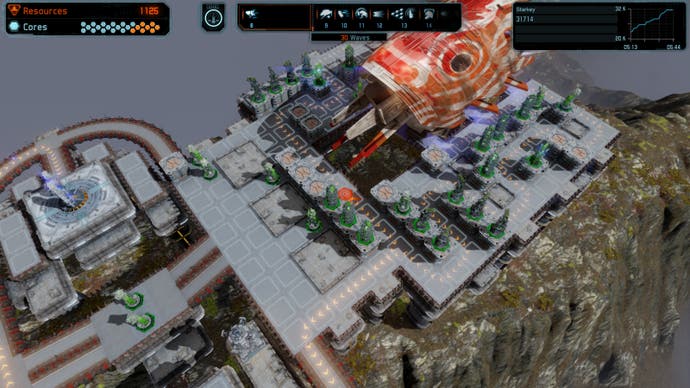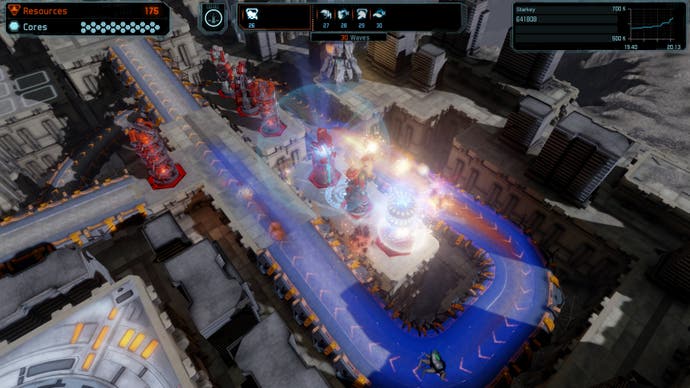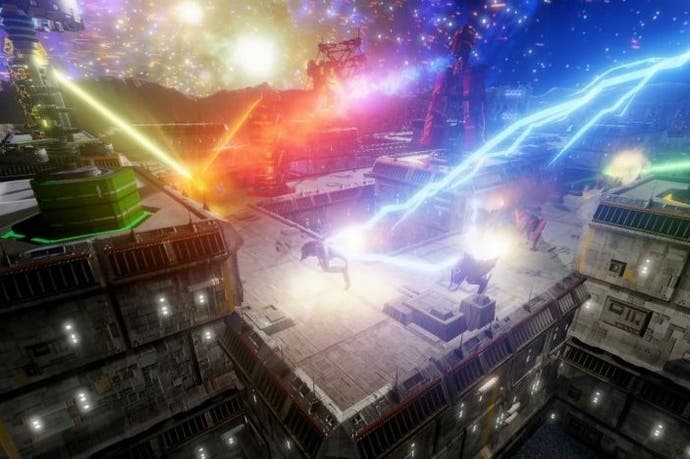Defense Grid 2 review
The best defence.
The basis of any given tower defence game is the narrow premise of placing towers to defend against some encroaching... thing. Honestly, the rest is quite vague. I've seen some that are meant to emulate doodles on a desk, and the invaders are office supplies. I've seen another where all of the turrets you use are Tetris pieces. And another where everything is made up of weird techno-lasers. These kinds of games are simple, often lacking any real narrative. In their day, they weren't too far flung from interactive click-bait.
Defense Grid came to define itself more by what it wasn't than by what it was. Where most tower defence games were cheap cash-ins, Defense Grid felt like a full game. In place of a nebulous pseudo-narrative, there was an actual plot. The love and care was evident and helped distinguish it from a genre infamous for mediocrity. Defense Grid 2 doesn't have quite the same baggage. The tower defence craze hasn't just subsided; it's been almost completely absent for years. In that sense, Defense Grid 2 feels paradoxically foreign and familiar. All of the elements with which you're likely familiar are there - towers, waves of different enemies, and some McGuffin you're tasked with protecting - but they seem out of place now. The fact that essentially nothing has changed in minute-to-minute play doesn't help.

You'll have a few main different kinds of towers - each with different specialisations and effects. Inferno Towers, for example, are great against groups of weak enemies, while cannons help with fewer, more heavily armoured foes. Which tower is most effective is determined by a combination of core stats - fire-rate, range, and total damage dealt per shot. Earlier in the game you can get by with just a few of each type for generalised coverage, but as the difficulty ramps up, you'll need to consider your choices a bit more carefully. You can upgrade and sell your towers as well, in case you need a bit more oomph or you found you've made a mistake in placement. Overall, though, the basics are straightforward. In fact, with the exception of the narrative, the only substantive difference is multiplayer modes. Now when you've finished the admittedly short campaign (I finished in less than six hours), instead of just trying it again on harder difficulties, you can put your skills to the test against or with other players.
Of these new options, Fighter, is particularly inventive. Since tower defence titles aren't typically conducive for head-to-head competition, you'll each have control of one side of a given map. Enemies that you kill will appear on your opponent's side and vice-versa. It's a very different take on the classic death match-style bout, and it still allows for a bit of strategy. While clearing your portion of the map is always important, based on your opponent's placement, you can adapt to give them a bit more trouble. There isn't a lot of latitude there, but it was still among my favourite additions. Ostensibly, the meat of Defense Grid 2 is the campaign and the narrative arc it carries.
Picking up over 1,000 years after the last game, you'll be trying to find a safe place to settle what's left of your planet's people while also repelling another alien invasion. Something's a bit different this time around, though. Your companions - all planetary defence AI systems - are being hacked and manipulated. No one's quite sure what's going on, and as time goes on, it seems that no one can be trusted.
By the story's end there are many more questions than answers; while the extra-terrestrials are thoughtful and calculating, they lack anything that we'd consider sapience. They seem unilaterally driven to crush humanity and reconnect with "the void." They're presented in a sympathetic light, as the aliens don't appear to have any control. Even so, the alternate perspective effectively establishes them as ruthless "villains." They cannot be deterred, and their goals necessarily mean humanity's end. That presents a kind of moral dilemma, but it's not one that you will engage with as a player. It's something you watch and observe.

Defence is an intrinsically passive act. It is a response, a reaction to. It places the defender in the position of repelling an external force. Defensive wars are noble, offensive ones are not. There's no concrete difference between the two other than which party initiates conflict. Defense Grid 2 is, quite obviously about defence, but it's also about being passive, about observing morally grey conflicts play out in front of you - without your input.
As a tower defence game it's also about planning. About waiting. About biding your time, and protecting yourself from those that wish you harm. The experience is unlike what I, as a gaming audience, am accustomed. More often than not, the verbs that I use to describe my time with a game are active - "shoot," "attack," "kill." Never "wait," at least not in a positive light. It's strange, then trying to describe my time with Defense Grid 2. I can't honestly say that I felt like I did anything.
As someone that simply waits and arranges the location of towers, I felt as if I was incidental. Any other character in the game could just as easily have replaced me, and the plot would remain largely the same. Still, there's something special about waiting. About that patience. As I saw wave after wave of alien soldiers ground to shreds by my turrets, I was sad. I wasn't out for blood. I wasn't revelling in the destruction of my enemies. I was defending myself. I was waiting.









